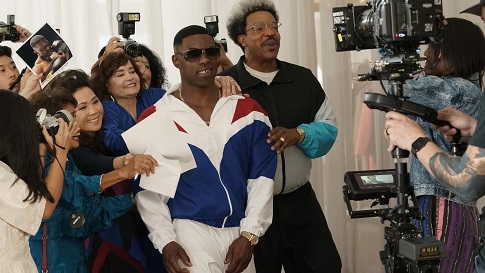“Who is Mike Tyson?” is question that’s asked by the new Hulu miniseries, Mike.
The answer to that question is that he’s a boring guy who did some interesting things.
For instance, he became a boxer and was briefly the world champion before he was brought down by his own hubris. That’s interesting, largely because it’s something that seems to happen to quite a few people who suddenly find themselves on top of the world but don’t have the maturity necessary to handle it. However, that, in itself, does not Mike Tyson an interesting human being. It just makes him an example of how history repeats itself.
He bit off an opponent’s ear during a boxing match. That’s interesting because it was such a savage act and it scandalized people who otherwise have no problem watching two men beat each other until one loses consciousness. Causing brain damage is okay but God forbid you bite off a piece of someone’s ear. But the fact that Mike bit off the guy’s ear does not, in itself, make Mike Tyson interesting. It just makes him a jerk.
Mike Tyson has a facial tattoo that doesn’t really mean anything. A lot of people have stupid tattoos.
Mike Tyson has a distinctive way of speaking. So do a lot of other people.
Mike Tyson spent three years in prison after being convicted of raping a contestant in a beauty pageant. Tyson was and is certainly more famous than the typical convict and, somehow, that conviction has not prevented him from becoming a beloved cultural institution in the United States. The hypocrisy is interesting. Mike Tyson is not.
At least, that’s the impression that I got from this 8-episode miniseries. Seven of the episodes feature Tyson (played by Trevante Rhodes) performing a one-man show in front of an audience in Indiana. Believe it or not, this is based on fact. Apparently, Mike Tyson did have a one-man show, in which he would discuss his career and his life. (Jeff even wrote a review of it for this very site!) We watch flashbacks as the show’s version of Tyson provides a self-serving narration and, to be honest, it seems like it would be the most boring one-man show ever. Tyson talks about growing up poor and with a mother who alternated between hating and loving him. He talks about his first trainer (played by Harvey Keitel, who often seems to be channeling Jonathan Banks) and his first marriage. Mostly he talks about how he feels that almost everyone in his life betrayed him. The first two episodes, which deal with Tyson’s youth, are effective because they examine how a childhood of mental and physical abuse can set the course of someone’s entire life. However, once adult Tyson shows up, Mike becomes far less compelling. It’s hard not to get tired of listening to him blame everyone else for his own increasingly poor decisions.
The one exception to the show’s format is episode 5, which is told from the point of view of Desiree Washington (Li Eubanks), the woman who Tyson was convicted of raping. This is a powerful stand-alone episode, both because of Eubanks’s performance and because it’s the only episode to not be seen through Tyson’s eyes. It’s the episode that allows the viewer to see Tyson the way the rest of the world saw Tyson. And yet it’s difficult to feel that, when viewed in the context of the entire miniseries, this episode is a bit of a cop-out. It’s the only episode to focus on someone who was hurt by Tyson but it’s surrounded by episodes that once again portray Tyson as being a victim of his managers, his fans, and society at large. Desiree is given one episode and then disappears from the narrative whereas the show’s version of Tyson is given seven episodes to justify himself. One gets the feeling that the show’s producers knew that they had to include Desiree but they also knew that revealing Tyson’s version of the events would have also meant revealing that he continues to insist that he was the victim and that would have totally messed up the show’s final redemption arc. And so, the narrative burden is temporarily placed on Desiree and Tyson only returns once it is time to discuss what it was like being in prison.
Mike was produced by Craig Gillespie, who also directed I, Tonya. Like I, Tonya, Mike features characters frequently breaking the fourth wall and talking directly to the audience. In fact, it happens so frequently that it gets to be kind of annoying. Breaking the fourth wall really wasn’t even that original when it happened in I, Tonya. In Mike, it becomes a trick that’s used to try to make Mike Tyson into a more interesting character than he is. But it feels empty, largely because it doesn’t tell us anything that we don’t already know or couldn’t have guessed on our own.
The miniseries itself was made without the participation of the real-life Mike Tyson. Tyson condemned the show as being an attempt to make money off of his life and he actually does have a point. Unfortunately, the miniseries itself doesn’t have anything new to add to the story of Tyson. It’s an 8 episode Wikipedia entry. At some point, the streaming services may need to realize that not every celeb needs to be the subject of a miniseries. Simply being famous does not always make for a compelling story.

Pingback: Lisa Marie’s Week In Television: 9/25/22 — 10/1/22 | Through the Shattered Lens
Pingback: Lisa Marie’s Week In Review: 9/26/22 — 10/2/22 | Through the Shattered Lens